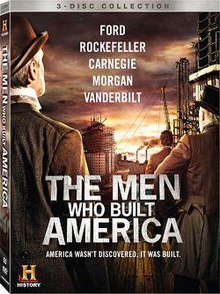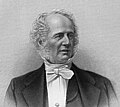The Men Who Built America
| The Men Who Built America | |
|---|---|
 Region 1 DVD cover | |
| Genre | Biography, Docudrama |
| Written by |
|
| Directed by | Patrick Reams, Ruán Magan |
| Starring |
|
| Narrated by | Campbell Scott |
| Theme music composer | "Save My Soul" by Blues Saraceno |
| Original language | English |
| No. of episodes | 4 |
| Production | |
| Cinematography | Richard V. Lopez Brian O'Carroll |
| Editors |
|
| Production company | Stephen David Entertainment |
| Original release | |
| Network | History Channel |
| Release | October 16 – November 11, 2012 |
| Related | |
The Men Who Built America (also known as The Innovators: The Men Who Built America in some international markets) is an eight-hour, four-part miniseries docudrama which was originally broadcast on the History Channel in autumn 2012, and on the History Channel UK in fall 2013. The series focuses on the lives of Cornelius Vanderbilt, John D. Rockefeller, Andrew Carnegie, J. P. Morgan, and Henry Ford. It tells how their industrial innovations and business empires revolutionized modern society. The series is directed by Patrick Reams and Ruán Magan and is narrated by Campbell Scott. It averaged 2.6 million total viewers (1.2 million adults 25–54 and 1 million adults 18–49) across four nights.
It is the first installment of the That Built franchise.
Cast
[edit]In alphabetical order:
- William Jennings Bryan – James Kidd
- Andrew Carnegie – (The Elder) – Adam Jonas Segaller
- Andrew Carnegie – (The Younger) – AJ Achinger
- Thomas Edison – Justin Morck
- James Fisk – Kenneth Cavett
- Henry Ford – Cary Donaldson
- Henry Clay Frick – John C. Bailey
- Jay Gould – Cameron McNary
- William McKinley – Dan Odell
- J. P. Morgan – (The Elder) – Ray Reynolds
- J. P. Morgan – (The Younger) – Eric Rolland
- Junius Spencer Morgan – Daniel Berkey
- John D. Rockefeller – Tim Getman
- Theodore Roosevelt – Joseph Wiegand
- Charles M. Schwab – John Keabler
- Thomas A. Scott – Don Meehan
- Nikola Tesla – Alex Falberg
- Cornelius Vanderbilt – David Donahoe
- William Henry Vanderbilt – Michael Chmiel
- George Westinghouse – Einar Gunn
Episodes
[edit]Note: The series consists of eight one-hour episodes; for TV they were combined into four two-hour episodes.
| No. | Title | Directed by | Written by | Original air date | |
|---|---|---|---|---|---|
| 1 | "A New War Begins" | Ruán Magan | David C. White, Keith Palmer | October 16, 2012 | |
|
Cornelius Vanderbilt grows from a steamboat entrepreneur to the head of a railroad empire, and gets into a heated rivalry with James Fisk and Jay Gould; the up and coming John D. Rockefeller founds Standard Oil. Many business owners lay their own rail lines which leads to the Panic of 1873. Later, Rockefeller starts to expand his wealth by diverting his business from the railroads to a new innovation, oil pipelines. | |||||
| 2 | "Bloody Battles/Blood Is Spilled" | Patrick Reams | David C. White, Keith Palmer | October 23, 2012 | |
|
Andrew Carnegie builds an empire around steel, but finds himself struggling to save face after the ruthless tactics of his business partner, Henry Clay Frick, result in both the Johnstown Flood as well as the bloody 1892 strike at the Homestead Steel Works.[1][2] | |||||
| 3 | "Changing the Game" | Patrick Reams | David C. White, Patrick Reams, Keith Palmer | October 30, 2012 | |
|
J. P. Morgan proceeds to banish the dark with the direct current electric light of Thomas Edison, but the two soon face serious competition from the alternating current of George Westinghouse and Nikola Tesla. As the 19th century comes to a close, the titans of industry must try to work together to stop a new threat in budding politician William Jennings Bryan, who threatens to dissolve monopolies in America. | |||||
| 4 | "When One Ends, Another Begins" | Patrick Reams | David C. White, Keith Palmer | November 11, 2012 | |
|
Rockefeller, Carnegie and Morgan team up to help elect William McKinley to the U.S. presidency by paying for his 1896 campaign, to avoid a possible attack on monopolies. However, fate intervenes when McKinley is suddenly assassinated, and Vice President Theodore Roosevelt assumes the presidency and promptly begins dissolving monopolies and trusts in America. Meanwhile, Morgan buys out Carnegie Steel to make Carnegie the richest man in the world, and Henry Ford designs an affordable automobile with his Model T and starts his own business, Ford Motor Company, which sets a new business model for companies to follow. | |||||
Reception
[edit]Neil Genzlinger from The New York Times observed that the series did not contain startling revelations about its principal subjects, although certainly gave them a modern-day relevance.[3]
Linda Holmes writing for NPR ridiculed the series for dull presentation, corny re-enactments and ineffective narration. She criticized the production for feeling "a lot like a tricked-out version of an elementary school filmstrip" and suggested that the series might be popular among those who accepted Donald Trump as one of the experts.[4]
Geoff Berkshire from Variety criticized the series for "overblown recreations backed by bombastic music, combined with tepid performances by the re-enactors and rudimentary writing". Mentioning the series' "ostentatious style [that] begins to grate within the first 30 minutes", he scorned "the talking heads [that] simply feel like filler" and the particular style of padding out the runtime when "the viewers are subjected to the customary recap of the previous segment after every ad break." He concluded that unlike the game-changing icons it intended to celebrate, the series failed to leave its mark.[5]
Verne Gay from Newsday gave the series "C" grade for "self-serving, obvious or of the fortune cookie variety" tips dispensed by the guests and for the lack of subtlety and historic context. On another hand, he praised the well-produced, although often static, recreations.[6]
On Metacritic the series has a score of 60 out of 100, based on 4 critics, indicating "mixed or average reviews".[7]
Home media release
[edit]The miniseries has been released by The History Channel on January 22, 2013, in a three-disc set in both DVD and Blu-ray Disc formats.[8]
References
[edit]- ^ "The Men Who Built America - Blood Is Spilled/Bloody Battles(Season 1, Episode 4/Season 1, Episode 102)". Apple TV+. Retrieved December 1, 2024.
- ^ "The Men Who Built America - Blood Is Spilled (Season 1, Episode 4)". Amazon (company). Retrieved December 1, 2024.
- ^ Genzlinger, Neil (15 October 2012). "Then as Now, Businessmen Bent on Power". The New York Times. Retrieved 21 November 2017.
- ^ Holmes, Linda (15 October 2012). "Money Is the Object and the Subject in History's 'The Men Who Built America'". Pop Culture Happy Hour. NPR. Retrieved 21 November 2017.
- ^ Berkshire, Geoff (15 October 2012). "The Men Who Built America". Variety. Retrieved 21 November 2017.
- ^ Gay, Verne (15 October 2012). "'Men Who Built America' review: History dud". Newsday. Retrieved 21 November 2017.
- ^ "The Men Who Built America". Metacritic. Retrieved 21 November 2017.
- ^ Lambert, David (November 30, 2012). "The Men Who Built America (mini-series) – Blu-rays, DVDs for This October's History Channel Miniseries". TVShowsOnDVD.com. Archived from the original on December 2, 2012. Retrieved December 3, 2012.
External links
[edit]- The Men Who Built America at the History Channel official website
- The Men Who Built America at IMDb
- 2012 American television series debuts
- 2012 American television series endings
- Documentary television series about technology
- Science docudramas
- History (American TV channel) original programming
- 2010s American drama television miniseries
- Television series about the history of the United States
- American television docudramas
- Cultural depictions of Thomas Edison
- Cultural depictions of Henry Ford
- Cultural depictions of William McKinley
- Cultural depictions of Theodore Roosevelt
- Cultural depictions of Nikola Tesla





